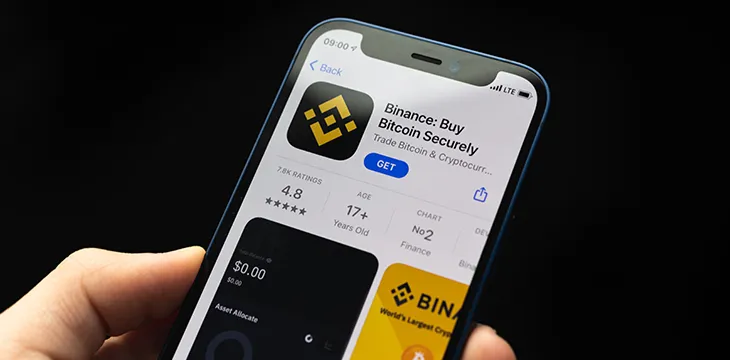|
Getting your Trinity Audio player ready...
|
Binance could be in major regulatory trouble with Uncle Sam after the controversial cryptocurrency exchange was accused of ignoring economic sanctions imposed on Iran.
On Monday, Reuters reported that Binance allowed Iran-based customers to transact on the exchange despite publicly claiming to have limited Iranian traders’ access to the exchange in November 2018. That year, U.S. President Donald Trump reimposed the sanctions that had been lifted in 2015 after Iran signed a nuclear agreement with the U.S. and multiple other countries.
One Iranian trader told Reuters that “all of the Iranians were using” Binance due to the exchange’s infamously lax ‘know your customer’ (KYC) requirements, which allowed traders to open accounts by providing only an email address. Binance didn’t get around to boosting its KYC requirements until September 2021.
Reuters also obtained internal communications from 2019 and 2020 that show senior Binance staff joking about the exchange’s continued popularity in Iran. Iran-based traders said they used virtual private networks (VPNs) to cloak their true IP addresses in order to access Binance, a tactic that Binance boss Changpeng ‘CZ’ Zhao publicly supported in a since-deleted June 2019 tweet that claimed VPNs were “a necessity, not an option” for masking one’s online activities.
Lawyers and sanctions experts told Reuters that Binance could face blowback from U.S. regulatory agencies, particularly if it could be proven that specific individuals targeted by the sanctions had used the exchange. Evidence that Binance enabled Iranian companies to evade the U.S. trade embargo could also leave the exchange open to potential regulatory action.
CZ responded to the Reuters article by tweeting that his exchange “has been using Reuters WorldCheck as one of the KYC verification tools since 2018.” World-Check, a database of ‘Politically Exposed Persons,’ was launched in 2002 and acquired by Thomson Reuters in 2011, although the latter sold a 55% stake in the company to The Blackstone Group in 2018.
CZ’s efforts to offload responsibility/blame for KYC cockups isn’t exactly new territory for him, given previous Reuters reports which showed that, until late last year, Binance’s paltry KYC/anti-money laundering (AML) efforts were largely for show.
CZ may feel that Binance is insulated from U.S. regulators by the fact that the exchange claims that it no longer services U.S. customers (although this too may be a lie) following the launch of its Binance.US offshoot. However, since Binance.US was explicitly formed as a pseudo-compliant entity to draw attention away from the crime-plagued Binance.com mothership, one can’t expect U.S. regulators to be all that forgiving.
Reckless and unlicensed Philippine promotion
This latest item of bad press cast some shade on the sunny celebrations Binance was enjoying in Paris for the fifth anniversary of the exchange’s founding. Typically, Reuters was far from the only cloud raining on Binance’s parade in recent days.
In the Philippines, Binance temporarily dodged a regulatory smackdown after the Department of Trade and Industry (DTI) said it had no authority to ban Binance from promoting its products to local residents. The DTI said its hands were tied because the country’s central bankers have yet to issue regulations specifically governing crypto.
Forkast News quoted a DTI spokesperson saying, “cryptocurrency and other forms of virtual assets are not consumer products.” As such, the DTI “has no jurisdiction to act on applications for sales and promotion permits to promote virtual assets per se in the absence of clear legislation on the matter.”
The DTI’s statement was prompted by Infrawatch PH, a public policy think tank, which issued a letter stating that Binance lacks licenses to operate in the Philippines and called on the DTI to prevent local residents from sending money to Binance. The letter cited “the reckless and unlicensed sales promotion of Binance, together with their vehement disregard to Philippine laws” as proof that customers were taking unnecessary risks by sending money to the exchange.
The letter also cited comments last month by Finance Secretary Carlos Dominguez III that warned local residents of Binance’s lack of registration with the Philippine government. Binance continues to insist that it is interested in acquiring the necessary Philippine permits, but this is a familiar ruse the company has deployed in countless other markets to allow it to continue operating without proper oversight for as long as possible.
Brazil nuts
Meanwhile, Binance restarted deposits and withdrawals for customers in Brazil last week following a dust-up between the exchange and its local banking partner. In mid-June, Binance suspended deposits and withdrawals after local payment processor Capitual accused Binance of failing to comply with Brazilian anti-money laundering regulations.
As reported by local media outlet Valor, Binance refused to observe new Central Bank regulations that require individualized customer accounts, rather than a catch-all account that obfuscates the identities of individual transactors. Capitual, which also handles money for the Huobi and Kucoin exchanges, stated that Binance was the only one of its customers that refused to comply and thus they had to halt activities connected with the exchange.
In its usual irony-free manner, Binance had the gall to suggest that Capitual’s actions “conflict with [Binance’s] values.” Clearly, observing local regulations does indeed conflict with Binance’s values (or lack thereof). But we suppose the Big Lie about Binance not being irredeemably compliance-averse only works if it’s repeated ad nauseum under whatever circumstances.
After threatening to sue Capitual for breach of contract, Binance eventually found a new financial dance partner in Latam Gateway. It’s unclear whether Binance’s new arrangement is compliant with the new Central Bank policy, but given the exchange’s previous disregard for Brazilian law, Binance shouldn’t expect an easy ride when the country’s new digital asset oversight rules finally take effect.
Binance’s Brazilian issues may have been foreshadowed this March, when CZ announced that Binance planned to acquire local banks and payment processors. So much easier convincing bankers to turn a blind eye toward shady activity if the bankers are on your payroll.
It’s perhaps worth remembering that one of Capitual’s founders was Glaidson Acácio dos Santos, known locally as ‘Bitcoin Pharaoh’ and who is suspected of ordering last year’s attempted murder of a local crypto rival and the successful murder of another. Glaidson is currently in jail for operating a crypto ponzi scheme that promised tens of thousands of clients a guaranteed 10% return on their investments but ultimately failed to deliver.
Binance claims to have worked with Brazilian authorities to help bring Glaidson to justice last year, in part by freezing his accounts. Yet Glaidson was somehow able to sell crypto tokens worth BRL228 million (US$42 million) after he was arrested with the help of a lawyer (who has since been arrested). It’s worth noting that Binance controls an estimated three-quarters of Brazil’s overall crypto volume. Given Binance’s disinterest in KYC/AML, maybe it’s not so incredible that Glaidson was able to work his magic from behind bars.
And yet, none of the above stopped Glaidson from declaring his candidacy for federal deputy of Rio de Janeiro in elections later this year. With that kind of chutzpah, we’re surprised CZ hasn’t hired Glaidson as Binance’s new compliance director.
Follow CoinGeek’s Crypto Crime Cartel series, which delves into the stream of groups from BitMEX to Binance, Bitcoin.com, Blockstream, ShapeShift, Coinbase, Ripple, Ethereum, FTX and Tether—who have co-opted the digital asset revolution and turned the industry into a minefield for naïve (and even experienced) players in the market.

 05-08-2025
05-08-2025 





